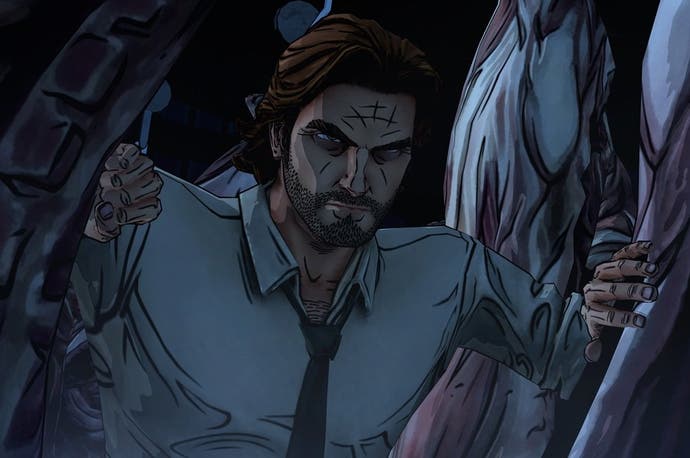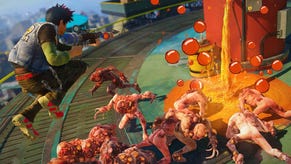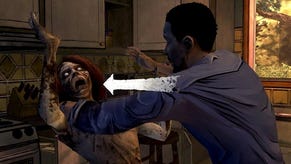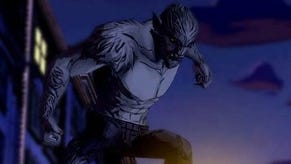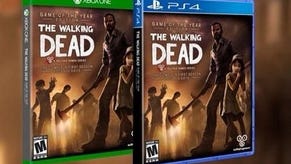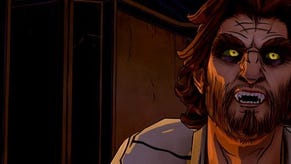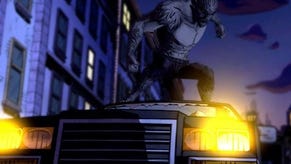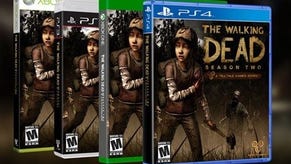The Wolf Among Us: In Sheep's Clothing review
Baa crawl.
Note: as ever with episodic games, this review contains spoilers for previous episodes of The Wolf Among Us. Proceed with caution!
The pieces finally fall into place in this penultimate chapter of Telltale's adaptation of Bill Willingham's graphic novel series. We've followed Bigby Wolf from one crummy end of Fabletown to the other, through dive bars, seedy hotels and scummy strip clubs, on the trail of a killer of fairytale prostitutes.
At the end of the previous episode, we found out who that killer is - or at least who ordered the killings. It's the Crooked Man, he of crooked sixpence and crooked mile infamy, and he's by far the game's most interesting addition to the comic-book canon. Physically twisted by torture and utterly cold in the way he grips and squeezes the desperate refugees of Fabletown, he's the sort of calmly malevolent crime lord who could actually slip into Willingham's pages and fit right in. For a series that has, up until now, skirted gingerly around the margins of the comic's lore, he's a bracingly bold invention.
He doesn't put in an appearance until much later, however. The bulk of this episode is about tracking him down, armed with the knowledge that it's the Crooked Man who is behind the nastiness you've been investigating. Along the way, Bigby is understandably keen to get some payback on Crooked Man's enforcer, Bloody Mary, the ruthless urban myth who left our hero with a vicious compound fracture at the end of Episode 3.
If you've played along this far, you'll know what that means, of course: prickly conversations with Snow White about the right way to proceed, leading to multiple scenes in which Bigby visits places in search of clues, the finding of which involves either snarling at or punching anyone who has potentially useful info, or occasionally searching a location by moving the cursor over highlighted objects to examine them. There's an action scene in which Bigby wolfs out on yet another of Crooked Man's truculent underlings, and it's another slightly sticky QTE affair that is held back by the stuttering game engine.
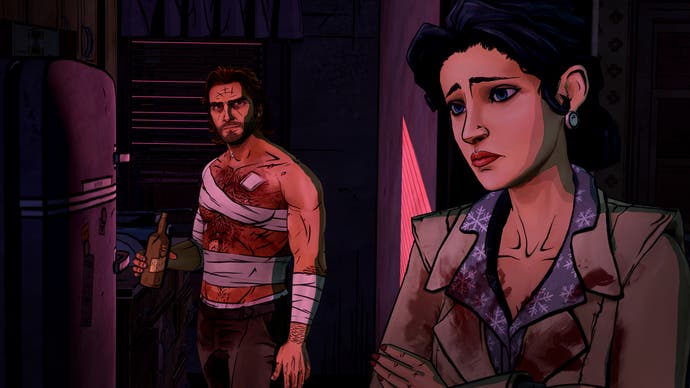
That sounds dismissive, though it's not really supposed to. I remain charmed by the world and story being shared here, but it's still not dazzling me in terms of gameplay. It's a criticism that keeps coming back with each episode, and I just can't shake it. I enjoy each new chapter as a viewer, but I'm always left feeling slightly unsatisfied as a gamer. Bigby's character, so compelling on the page, still feels too narrow when I'm asked to actually play as him, modulating his demeanour between the limited poles of merely grumpy and savagely furious.
It perhaps doesn't help that, with the end in sight, I'm uncomfortably aware that this is a detective story where I've not really done any detecting, and at this stage it's clear that I'm not likely to. Telltale's new model of adventure game design, swapping arcane puzzles for emotional diplomacy, makes for more robust narrative but also means that there can be no dead ends. There's literally no way to fail or get stuck, since without story there's nothing here. The result is a game that lets you make choices, but can never let those choices deviate you from the correct path. No matter what you've done, you'll reach the end of this chapter and confront the Crooked Man - a villain whose identity was handed to you out of the blue at the end of Episode 3, regardless of your investigations.
That constant narrative slide forwards brings its own challenges and pleasures of course, not least in the gnawing worry that you're going to say the wrong thing to someone, but when you know that none of the options will stop you from seeing the story to its conclusion, it can be easy to wonder what influence you're actually having on the experience, especially when you replay a section and discover just how many conversation trees lead to the exact same outcome.
Four episodes in, and while it's not entirely clear how your choices have impacted the story, the interactions with other characters are at least starting to resonate pretty strongly. There's a lovely scene in this chapter with Beauty and Beast that manages to say something quietly profound about the immigrant experience, while also adding shade to a well observed and deftly drawn relationship.
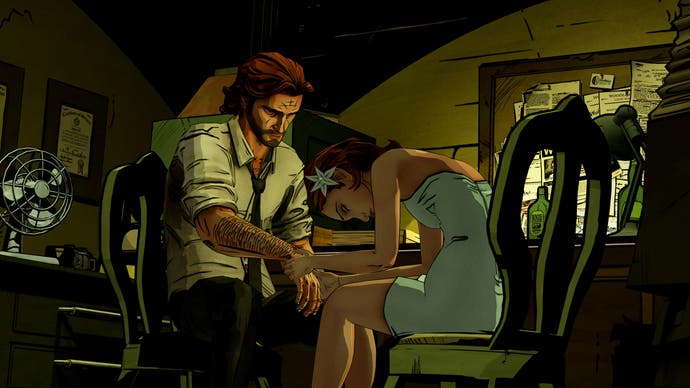
There's an underlying theme that, as the de facto leaders of the Fables community, the bureaucracy represented by Bigby and Snow isn't enough for everyone under their care. The idea of the criminal kingpin who positions himself as the valid opposite of the law-abiding hero, satisfying the needs that the rigid and blinkered system outlaws, is a cliché but it works well in this setting. This is especially true when we see the hint of truth illustrated in characters we've come to know and understand. Even Mr Toad, that obstinate blowhard, and Colin the annoying pig give your heartstrings a little tug as you realise that the law Bigby fights to uphold is applied unevenly and unfairly.
I'm not convinced that choices from Episode 1 these characters are supposed to have remembered have steered us down this path so much as good writing, charismatic acting and simply spending time with them over the course of the story, but it's in conversations with these peripheral characters that I find myself most immersed in Bigby's responses. In those moments that I feel like it matters how I react, offering a glimmer of hope or a cruel-to-be-kind refusal. The world comes alive, but it's telling that these scenes exist almost entirely separate from the main storyline. This richness and depth of personal interaction, if nothing else, is Telltale's great gift to gaming.
The ending of this episode is one that almost feels anticlimactic, until you realise what it portends. It's been a winding road to get to it, with a few diversions that look a little like padding in retrospect, but it sets up a final chapter that promises to be something pretty special.
As a story, then, The Wolf Among Us is coming together nicely. As a game, it still feels remote, a little snagged on the same repetitive systems. With The Walking Dead, Telltale showed us a new way to experience stories via a joypad. As it takes on more and more projects, it really needs to show that its new formula is as flexible as it is formidable.
